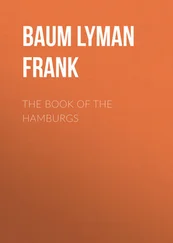L. Baum - The Last Egyptian
Здесь есть возможность читать онлайн «L. Baum - The Last Egyptian» весь текст электронной книги совершенно бесплатно (целиком полную версию без сокращений). В некоторых случаях можно слушать аудио, скачать через торрент в формате fb2 и присутствует краткое содержание. Год выпуска: 2019, Издательство: epubBooks Classics, Жанр: Прочие приключения, на английском языке. Описание произведения, (предисловие) а так же отзывы посетителей доступны на портале библиотеки ЛибКат.
- Название:The Last Egyptian
- Автор:
- Издательство:epubBooks Classics
- Жанр:
- Год:2019
- ISBN:нет данных
- Рейтинг книги:4 / 5. Голосов: 1
-
Избранное:Добавить в избранное
- Отзывы:
-
Ваша оценка:
- 80
- 1
- 2
- 3
- 4
- 5
The Last Egyptian: краткое содержание, описание и аннотация
Предлагаем к чтению аннотацию, описание, краткое содержание или предисловие (зависит от того, что написал сам автор книги «The Last Egyptian»). Если вы не нашли необходимую информацию о книге — напишите в комментариях, мы постараемся отыскать её.
The Last Egyptian — читать онлайн бесплатно полную книгу (весь текст) целиком
Ниже представлен текст книги, разбитый по страницам. Система сохранения места последней прочитанной страницы, позволяет с удобством читать онлайн бесплатно книгу «The Last Egyptian», без необходимости каждый раз заново искать на чём Вы остановились. Поставьте закладку, и сможете в любой момент перейти на страницу, на которой закончили чтение.
Интервал:
Закладка:
Tadros ran to the house of Hatatcha, where Consinor, having rebelled at the confinement in old Nefert’s hovel, had that morning installed himself. It was as safe a refuge as the other, for none of the villagers ventured to enter the grim archway, and so long as the viscount escaped observation Tadros was content. There was little cheer in the gloomy room, however, and Consinor had begun to believe that he could scarcely be recompensed for the miserable hours of waiting by the promised reward when, to his infinite relief, his fellow–conspirator entered to announce that the long–anticipated time for action had arrived.
“There is not a moment to be lost,” said Tadros. “Get under the rushes, quick!”
The viscount immediately burrowed beneath the dry rushes, and the dragoman placed him in such a position that his head was elevated slightly and rested against the stones of the wall, thus enabling him to observe every corner of the room through the loosely strewn covering.
Having safely concealed him, Tadros stood back and examined the rushes critically to satisfy himself that Kāra would have no suspicion that they had been recently disturbed. The arrangement was admirable. He could not see Consinor himself, even though he knew he was hidden there.
“Are you comfortable?” he asked.
“Not very.”
“I mean, can you remain quietly in that position for an hour or more?”
“Yes,” answered Consinor, through the rushes.
“Then I will go,” announced Tadros. “Be very careful in your actions. Remember that a fortune for both of us hinges upon the events of the next hour, and we must make no mistake. I go to watch the street and the desert beyond. Farewell, and may fortune attend you!”
He left the house, dropping the ragged mat over the inner arch and then crossing to Nefert’s hut.
Presently Sĕra came running toward him.
“He has landed and is coming this way,” she reported.
“Very well. Go home.”
“The cigarettes are all gone.”
He tossed her another box, and soon she had disappeared within her own doorway. Nephthys was not with her, but Tadros had forgotten the girl just then.
He crept within Nefert’s front room and hid himself in the shadows in such a way that he could see through the hole, which served as a window, the opposite archway of Hatatcha’s dwelling.
Kāra entered the narrow street and looked cautiously around him. It pleased him that no curious native was in sight. The sheik and his band were in possession of the dahabeah and the prisoners, and were awaiting Kāra’s return with impatience. Therefore, he must enter the secret tomb at once, without the cover of darkness to shield his movements; but the inhabitants of Fedah were dull and apathetic—they were not likely to spy upon him.
He glanced with pride at the ring he wore upon his finger. The talisman of Ahtka–Rā was indeed powerful, for it had enabled him to accomplish all that he desired, and was protecting him even now. Should he take this occasion to restore it to the tomb of his ancestor—that ancient one who had entreated that it be left with his mummy for all time, and had threatened with dire misfortune anyone who dared to remove it? Why should Kāra leave the precious Stone of Fortune in that mountainous dungeon? Why should he deprive himself of the powers it bestowed upon its possessor? It could not now benefit Ahtka–Rā, who was long since forgotten in the nether world; but it might be of service to Kāra in many ways. Yes; he would keep it, despite the pleading and curses of that dead one who so foolishly and selfishly wished it left with his mummy.
Perhaps some day, years hence, he would restore the stone to the sarcophagus from whence he had taken it; but not now. Again he looked at the strange jewel, which seemed of extraordinary brilliancy at that moment, shooting its tongues of flame in every direction. The curse? Henf! Why should he care for the curse of a mummy, when the greatest talisman of fortune in the world was his?
He slipped within the archway of his dwelling and drew the mat closely behind him. Tadros had marked his every movement, and now breathed a sigh of relief. For the present, at all events, the adventure was in Consinor’s keeping rather than his own, and Consinor must suffer the risk of detection.
The dragoman settled himself upon an earthen bench and kept his eyes on the archway. Presently Nephthys came stealing into view, treading with the caution of a cat and crouching low beneath the stone arch. She did not attempt to draw aside the mat, but squatted upon the ground just outside the barrier. Tadros observed her curiously, and noticed that one of her hands was thrust within her bosom, as if clutching some weapon.
A dagger? Perhaps. Nephthys had been wronged, and might be excused for hating Kāra. Should the dragoman interfere to save him? To what end? Before the girl could strike, the royal one’s secret would be in Consinor’s possession, and then—why, Nephthys would save them any annoyance their discovery might entail. Clearly, it was not a case that merited interference.
Meantime Consinor had noted the entrance of Kāra, as well as the care with which the matting had been fastened to keep out prying eyes. It shut out most of the light, also; but that bothered the Egyptian more than it did the Englishman, whose eyes had now grown accustomed to the dimness.
Kāra had to feel his way along the wall to the secret crypt, but he knew the location of the place exactly, and soon found it. Consinor saw him take from the recess a slender bronze dagger with a queerly shaped blade, and an antique oil lamp. With these he approached the opposite wall of the room—that which was built against the mountain—and pushed vigorously against one of the stones.
It swung inward. The spy saw only blackness beyond; but his first consideration was to count the stones from the corner to the opening, and then to note that it was in the third tier or layer of masonry. By this time Kāra had crept through and closed the orifice.
Consinor was breathing heavily with excitement. The great discovery had been made with ease. All he need do was to wait until Kāra came out and left the village, and then he would be able to visit the secret tomb and its treasure–chamber himself.
But as the moments slowly passed—moments whose length was exaggerated into seeming hours—Consinor began to feel uneasy. He remembered that Tadros had impressed upon him the necessity of following Kāra wherever he went. The secret might not be all upon the surface.
Fearful that he had wasted precious time in delay, he threw aside the covering of rushes and approached the wall. It was scarcely necessary to count the stones. He had stared at them so long that he knew the exact spot which Kāra had touched.
Responsive to his push, the great stone again swung backward and he crept through as the other had done and found himself confronted with blackness.
The dragoman had foreseen such an event, and had thoughtfully provided his accomplice with a candle. Consinor lit it, and, leaving the stone entrance somewhat ajar, so that he might have no trouble in escaping if he were compelled to return in haste, he began a cautious exploration of the various passages that led into the mountain.
He lost some time in pursuing false trails; but at length he came upon a burnt match, tossed carelessly aside when Kāra had lighted his lamp, and it lay within the entrance of a rough and forbidding–looking gallery between the rocks.
However, Consinor followed this trail, and after stumbling along blindly until it had nearly ended in a cul–de–sac, he came to a circular door in the cliff which stood wide open. Beyond was a passage carefully built by man into the very heart of the mountain.
Читать дальшеИнтервал:
Закладка:
Похожие книги на «The Last Egyptian»
Представляем Вашему вниманию похожие книги на «The Last Egyptian» списком для выбора. Мы отобрали схожую по названию и смыслу литературу в надежде предоставить читателям больше вариантов отыскать новые, интересные, ещё непрочитанные произведения.
Обсуждение, отзывы о книге «The Last Egyptian» и просто собственные мнения читателей. Оставьте ваши комментарии, напишите, что Вы думаете о произведении, его смысле или главных героях. Укажите что конкретно понравилось, а что нет, и почему Вы так считаете.












